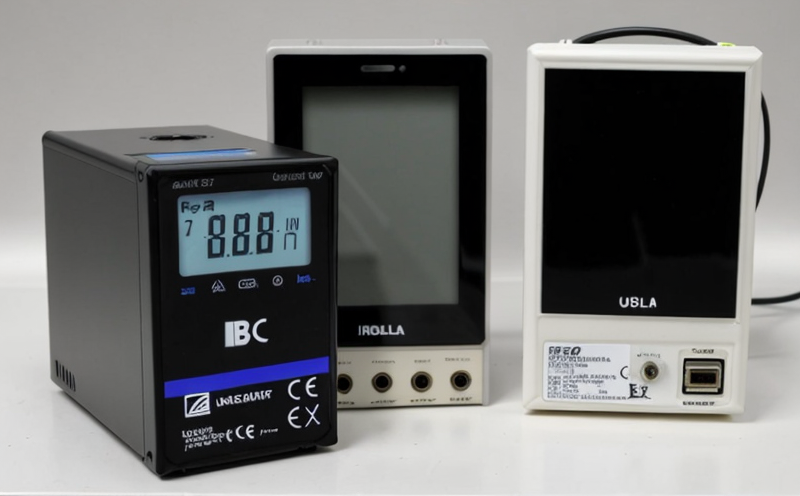JIS C8715 Consumer Electronics Portable Lithium-Ion Battery Testing
The JIS C8715 standard is specifically designed to ensure that portable lithium-ion batteries used in consumer electronics meet the necessary safety, performance, and durability requirements. This standard encompasses a wide range of tests aimed at evaluating various aspects of battery behavior under different conditions. Compliance with this standard is crucial for manufacturers as it ensures product safety and reliability while meeting regulatory requirements.
The testing process involves multiple stages to evaluate different parameters that could affect the performance and safety of lithium-ion batteries in consumer electronics. These include internal resistance measurement, voltage regulation tests, capacity retention tests, cycle durability tests, and more. Each test is conducted under controlled conditions to simulate real-world usage scenarios accurately.
For instance, during the internal resistance measurement, the battery's ability to handle current efficiently is assessed. This helps identify any potential issues that could lead to overheating or reduced performance over time. Voltage regulation tests ensure that the battery maintains its voltage levels within acceptable limits throughout its operational life. Capacity retention tests assess how much charge the battery can hold after a specified number of cycles, which is critical for determining longevity.
Another important aspect tested under JIS C8715 is cycle durability, where batteries are subjected to repeated charging and discharging cycles to evaluate their long-term performance stability. This section also includes high-temperature storage tests and low-temperature operation assessments, ensuring that the battery performs consistently across a wide range of environmental conditions.
The testing process requires meticulous preparation of specimens, which involves selecting appropriate samples representative of the target product line. Proper calibration of test equipment is essential to obtain accurate results. Once the specimens are prepared, they undergo rigorous testing protocols defined by JIS C8715. The results from these tests are then analyzed comprehensively to ensure full compliance with all specified criteria.
Compliance with JIS C8715 not only enhances consumer safety but also improves brand reputation and market competitiveness. By adhering strictly to this standard, manufacturers can gain confidence in delivering high-quality products that meet both internal quality standards and external regulatory expectations.
Applied Standards
| Standard Name | Description |
|---|---|
| JIS C8715 | This standard provides comprehensive guidelines for the safety and performance evaluation of portable lithium-ion batteries used in consumer electronics. |
| IEC 62133 | International standard for safety requirements of rechargeable cells, modules, and batteries intended for road vehicles. |
| UL 1642 | Underwriters Laboratories' battery safety standards applicable to all types of lithium-ion batteries. |
| CNAC N3809.5 | National standard for portable electronic products using rechargeable cells or batteries, covering testing methods and requirements. |
Why Choose This Test
The JIS C8715 battery test is essential for several reasons. Firstly, it ensures the highest level of safety by identifying potential hazards early in the development process. Secondly, compliance with this standard can significantly reduce product liability risks and avoid costly recalls or market withdrawals. Thirdly, meeting these stringent requirements enhances consumer trust, fostering better brand loyalty and customer satisfaction.
Moreover, adhering to JIS C8715 helps companies stay ahead of regulatory changes and keep their products competitive in the global market. It demonstrates a commitment to quality and sustainability that resonates well with environmentally conscious consumers. By choosing this test, manufacturers can ensure they are meeting not just current standards but also future expectations.
The detailed nature of JIS C8715 ensures thoroughness in every aspect of battery performance evaluation. This comprehensive approach helps manufacturers identify areas for improvement early on, leading to more reliable and efficient products. Ultimately, selecting this test guarantees robustness against failures due to improper design or manufacturing processes.
Customer Impact and Satisfaction
The impact of JIS C8715 compliance extends beyond mere regulatory adherence; it profoundly influences customer satisfaction by addressing critical safety concerns. When consumers know that their electronic devices are rigorously tested for safety, they feel reassured about purchasing them. This trust fosters stronger relationships between brands and customers.
Additionally, successful completion of these tests leads to enhanced product reliability, which translates directly into higher levels of customer satisfaction. Reliable products reduce the need for frequent replacements or repairs, thereby saving time and money for users. Such positive experiences contribute significantly towards building brand loyalty over time.
For quality managers and compliance officers within organizations, ensuring adherence to JIS C8715 provides peace of mind knowing that they are doing everything possible to protect both their company’s reputation and the well-being of end-users. R&D engineers benefit from having access to detailed data generated through these rigorous tests, allowing them to make informed decisions regarding design improvements.
Finally, procurement teams can leverage insights gained from third-party labs performing JIS C8715 testing when selecting suppliers. This ensures that all components used in manufacturing are up-to-standard, further enhancing overall product quality and consistency.





